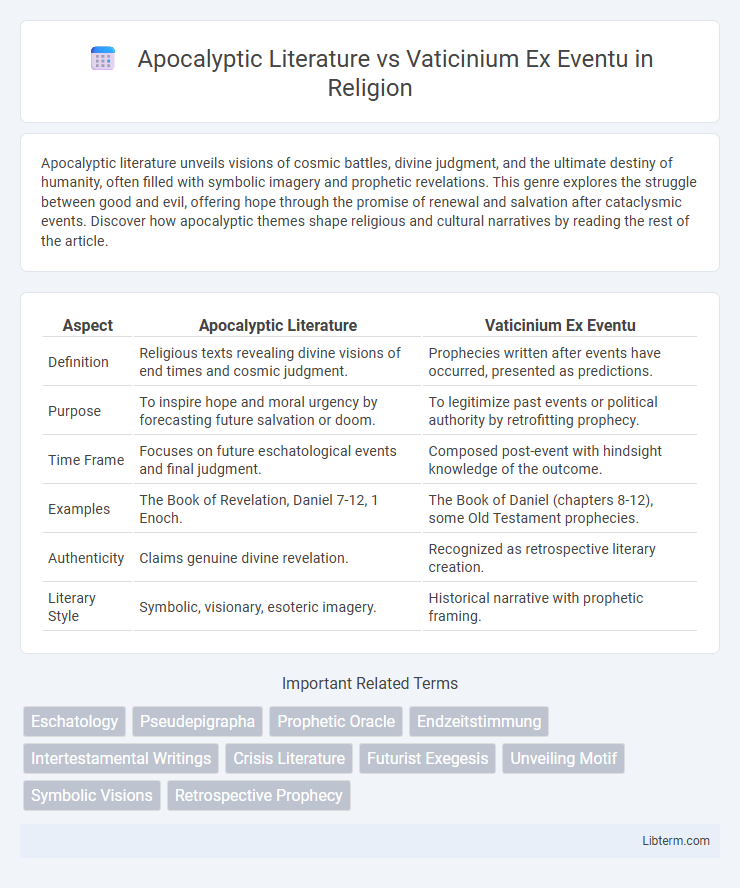Apocalyptic literature unveils visions of cosmic battles, divine judgment, and the ultimate destiny of humanity, often filled with symbolic imagery and prophetic revelations. This genre explores the struggle between good and evil, offering hope through the promise of renewal and salvation after cataclysmic events. Discover how apocalyptic themes shape religious and cultural narratives by reading the rest of the article.
Table of Comparison
| Aspect | Apocalyptic Literature | Vaticinium Ex Eventu |
|---|---|---|
| Definition | Religious texts revealing divine visions of end times and cosmic judgment. | Prophecies written after events have occurred, presented as predictions. |
| Purpose | To inspire hope and moral urgency by forecasting future salvation or doom. | To legitimize past events or political authority by retrofitting prophecy. |
| Time Frame | Focuses on future eschatological events and final judgment. | Composed post-event with hindsight knowledge of the outcome. |
| Examples | The Book of Revelation, Daniel 7-12, 1 Enoch. | The Book of Daniel (chapters 8-12), some Old Testament prophecies. |
| Authenticity | Claims genuine divine revelation. | Recognized as retrospective literary creation. |
| Literary Style | Symbolic, visionary, esoteric imagery. | Historical narrative with prophetic framing. |
Introduction to Apocalyptic Literature
Apocalyptic literature unveils divine revelations about the end times, employing symbolic language and vivid imagery to convey cosmic struggles and ultimate judgment. This literary genre often features visions, angelic messengers, and predictions that reveal God's plan for history's culmination. Unlike vaticinium ex eventu, which retrospectively predicts events after they occur, apocalyptic literature presents forward-looking prophecies meant to inspire hope and perseverance amid persecution.
Defining Vaticinium Ex Eventu
Vaticinium ex eventu refers to prophecies written after the events they predict have already occurred, contrasting sharply with authentic apocalyptic literature, which claims genuine foresight into future events. This literary technique is often used to lend credibility to texts by presenting past occurrences as prophetic revelations. Understanding vaticinium ex eventu is essential for analyzing the historicity and interpretative frameworks of apocalyptic writings in religious and literary studies.
Origins and Historical Contexts
Apocalyptic literature originated in Jewish and early Christian contexts from the second century BCE to the first century CE, reflecting themes of divine revelation, cosmic conflict, and imminent judgment amid social and political turmoil. Vaticinium ex eventu, or prophecy after the event, emerged as a literary technique during the Hellenistic and Roman periods, allowing authors to present past events as foretold predictions to legitimize authority and religious claims. Both forms reveal the historical context of persecution, oppression, and hope for deliverance, with apocalyptic works aiming to inspire resistance and vaticinia ex eventu enhancing credibility through retrospective prophecy.
Core Themes in Apocalyptic Texts
Core themes in apocalyptic literature emphasize divine judgment, cosmic dualism, and eschatological hope, portraying the ultimate triumph of good over evil through symbolic visions and prophetic revelations. Vaticinium ex eventu often retroactively frames historical events as fulfilling prior prophecies, contrasting with the forward-looking, future-oriented nature of true apocalyptic texts. The apocalyptic genre uniquely integrates themes of cosmic conflict, hope for redemption, and divine intervention to inspire faith amid persecution.
Prophetic Techniques: True Prophecy vs. Retrospective Prediction
Apocalyptic literature employs symbolic visions and metaphors to convey future divine judgments and cosmic events, emphasizing true prophecy based on inspired revelation. Vaticinium ex eventu, in contrast, uses retrospective prediction by writing accounts after events have occurred, presenting history as prophecy to legitimize claims or encourage faith. The distinction lies in apocalyptic texts' forward-looking, revelatory nature versus vaticinium ex eventu's backward formulation of predictions, impacting the interpretation of prophetic authenticity and intent.
Literary Structures and Symbolism
Apocalyptic literature employs complex literary structures such as visions, symbolic imagery, and dualistic cosmic battles to convey revelations about divine judgment and ultimate salvation. Vaticinium ex eventu, or prophecy after the fact, uses retrospective narrative techniques, often embedding historical events within symbolic frameworks to legitimize its predictive claims. Both genres rely heavily on symbolism, but apocalyptic texts emphasize eschatological motifs and cyclical time, whereas vaticinium ex eventu focuses on historical validation through allegorical representation.
Purpose and Audience of Apocalyptic Writings
Apocalyptic literature primarily serves to reveal divine mysteries and offer hope to persecuted communities by depicting cosmic battles and future restoration, addressing believers facing oppression. Its purpose is to encourage faithfulness and endurance through symbolic visions and prophetic revelations that transcend immediate historical circumstances. The audience consists mainly of marginalized groups seeking reassurance of divine justice and ultimate triumph over evil.
Vaticinium Ex Eventu in Ancient Texts
Vaticinium Ex Eventu refers to prophecies written after the events they predict, a common feature in ancient texts like the Hebrew Bible and Roman historical writings. These retrospective forecasts serve to legitimize religious or political authority by framing historical events as divinely ordained. Unlike apocalyptic literature, which often presents visionary predictions of the end times, Vaticinium Ex Eventu reinforces the narrative by embedding past occurrences within prophetic frameworks.
Impact on Religious Interpretation
Apocalyptic literature profoundly shapes religious interpretation by revealing divine mysteries through symbolic visions of end times, influencing eschatological beliefs across Judaism and Christianity. Vaticinium ex eventu, or prophecy after the fact, impacts interpretation by retroactively validating sacred texts, often challenging the authenticity of prophetic claims and prompting critical theological reassessment. This interplay between genuine apocalyptic revelation and post-event prophecy affects doctrinal development and the understanding of divine communication within religious traditions.
Distinguishing Features and Lasting Influence
Apocalyptic literature features symbolic visions and revelations about future divine judgment and cosmic transformation, often conveying hope amidst suffering through eschatological themes found in texts like Daniel and Revelation. Vaticinium ex eventu involves prophetic writings crafted after events have occurred, serving to legitimize current beliefs or rulers by retroactively predicting past events with apparent accuracy. The lasting influence of apocalyptic literature includes shaping religious eschatology and inspiring cultural narratives of salvation, while vaticinium ex eventu underscores historiographical strategies and the interpretation of prophecy in religious and political contexts.
Apocalyptic Literature Infographic

 libterm.com
libterm.com